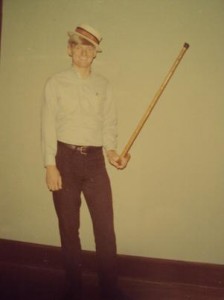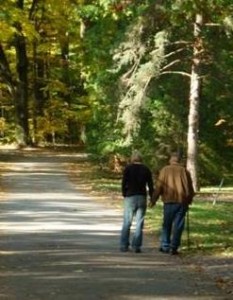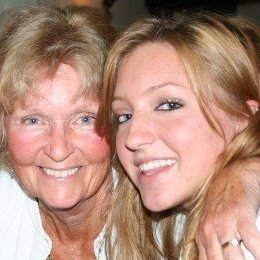As Birgitta and I entered the cottage under the weight of our traveling burdens tonight, I set mine down near the fireplace. My eyes fell on Nate’s wooden cane in the corner there, standing just where he left it nearly six months ago. Although Hospice had provided a wheeled walker and a wheelchair for his use and safety, he preferred the cane.
I remember the day Nate received that cane from the University of Illinois in the fall of 1969, when he was a second year law student. My memory is muddy as to the reason some of the students got canes and white straw hats to go with them, but the day he brought them home to our little apartment, his mood was upbeat and silly.
The two of us had fun with his cane and hat that night, laughing at each other as we attempted stunts and dressed up to snap photos. (Poverty stricken grad students have to find fun wherever they can.)
Tonight the cane represented something entirely different: cancer and weakness. As the days of last October went by, Nate’s ability to support his own weight waned, and he needed assistance to walk and stand. Even then, he pushed himself to take short trips outdoors, several each day. When he first started using the cane, he felt fresh confidence and refused other assistance. But gradually he needed a hand, then two helpers, one on each side, and finally couldn’t continue at all.
Despite the difficulties of these walks, they offered several things to Nate. The weather last fall was spectacular, and the entire neighborhood glowed gold with its backdrop of yellow maples. The exercise did Nate good, helping to keep him relaxed with so much lazy-boy time and no other outlet for his nervous energy. And it was a sweet time of conversation and companionship for whomever was assisting him.
Several of us went on his last walk, which occurred four days before he died. We slowly walked down our narrow lane to the corner, and I was the one holding his hand. He gripped the cane in his other hand and tapped acorns along the way, sometimes using it to bang them open with a sharp blow. We came to the turn in the road, and I suggested we go back, since he was getting wobbly. “We’re not quite at the end yet,” he said. “I’ll tell you when.”
We paced four more steps to a crack that ran across the asphalt. “There,” he said. “Now we turn around.” He wanted to do it “all the way,” just as he’d done before. I had to admire that spunk.
His cane, now resting in the corner gathering dust, was put to good use, both in 1969 and 2009. Once in a while we all need to lean on something when we’re feeling weak. When a hand isn’t enough, we need a cane. When that, too, is insufficient, we climb in a wheelchair, and after that, a bed. And in the end, when nothing at all but weakness remains, we lean, at long last, on God alone.
“Even to your old age I am He, and to gray hairs I will carry you. I have made, and I will bear; I will carry and will save.” (Isaiah 46:4)





